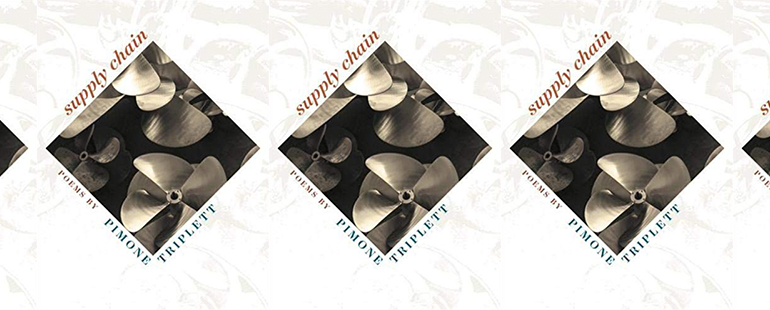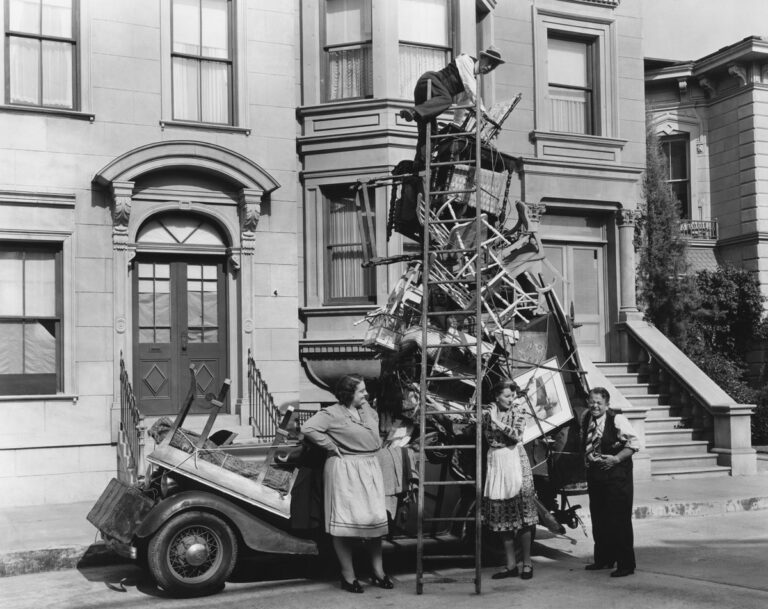Form, Sound, and Thought in Supply Chain

Pimone Triplett, whose most recent poetry collection, Supply Chain, was published in 2017, is the author of three previous volumes: Ruining the Picture (1998), The Price of Light (2005), and Rumor (2009). Taken together, these four collections present an intriguing progression of style from the straightforward lyric to something more entrenched and entropic, more elliptical and critical. Yet it is not a series of costume changes that the idea of stylistic progression might suggest (and as some poets do undergo): rather, Triplett’s poems keen ever closer to their subjects—so closely, in fact, as to become the very means by which they interrogate them. With a lushness of language and tumbling syntax descended from, among others, Gerard Manley Hopkins’s dappled sensory idiom—the result of a devotion to the world and an equally impassioned study of it—Triplett deepens the poet’s task of description into a means of rigorous, direct inquiry.
Supply Chain, a spurt of just twenty-two poems, is a study of reticulations that tracks the moral implications, embedded in cycles, systems, and ratios, of many different but related situations. “[M]y hand on the fridge handle / unhands whole networks,” she contends in her opening poem “Round Earth’s Corner.” It is in this paradoxical manner that she opens portals of concern, poem by poem, to not merely represent, but to think through problems of capital, networks, diaspora, class, familial ties, property, environmental precarity, and cultural associations that underpin daily life in the United States. In the simplest act of opening a refrigerator for “last week’s Buddha Delight,” for example, Triplett formalizes this gesture into an occasion for examination not merely of the prolonging of shelf life, but the entire electrical network “keeping me connected, the metals / dug, welded, smelted from cooling cores, / bauxite and ore, beat to unairy thinness, / underground passages, new flanged steel.” Understanding the link between production and consumption is, in our historical moment, relatively easy. But to stage an encounter in gesture, “operation’s shimmy,” and to use not just the appliance itself, but the poem’s own network of ongoing participles, sound, and phrasal torquing in order to dramatize that living interconnectedness is the ambitious enactment of a poetics that Triplett, unflinchingly, inhabits.
To use the poem as proof of its own operations harkens back to, foremostly, Wallace Stevens, who lamented in “The Man with the Blue Guitar”: “I cannot bring a world quite round, / Although I patch it as I can.” But Triplett is less motivated by the restorative handiwork of patching than by finding new forms of truth within the “corner”—the point at which two lines meet at a hard angle to produce space—of the poem itself and its subject, “this coffin-sized hole of near-freezing I take from.” Instead, then, she substitutes herself as the poem’s own contribution to the “Power Service”: “let me be / the thought you think, one synapse among the many.” Offering herself as “synapse” undercuts the normal epiphanic work of the lyric poem—there’s no virtuous self-styling at stake, and we are presented with a relation that suggests an analogic set of networks: neural, social, linguistic, technological, economic. For Triplett, here, as was so for James Joyce in Ulysses, “the longest way round is the shortest way home.” The activity of thinking, with its accidental sparkings and discursive connections, propels Triplett through the sonically-dense occasional poems that make up Supply Chain, in which she repurposes some of poetry’s perhaps more conservative elements—form and tradition—to radically reoriented ends.
The occasional poem is a more ephemeral form than most: its definition suggests a timeframe for a subject that is already fading from view, but is preserved by nature of the poet’s observation. And its tradition is kind of an odd one: within in it, elegy, ode, and landscape poetry span the public, like Marvell’s “Horatian Ode,” and the private, like some of Lorine Niedecker’s work. Loosened from its ceremonial function by, among other examples, William Wordsworth’s The Prelude, however, Triplett’s occasional poem serves as a frame for the ethical measurement of its own parts. Her poems are still lyrics in their flitting over the transom between interiority and exterior experience, but Triplett’s innovation in this collection is her update to the possibilities for what the lyric itself can do in response to our intricately linked, hyper-saturated material world.
We can attribute such a curious combination of density and accessibility to the incorporation of Triplett’s own process of thinking into verse. And each poem, differently situated, thinks by way of its smallest possible units as she signals, gesturing to both reader and sound: “[t]his way, little syllable, this way.” In this way, we can read her in relationship with, most importantly, Marianne Moore. Triplett’s update to this tradition is not that the symmetrical arrangement of syllables alone makes up form—it is that the material textures of words’ particulars are intended to provide pleasure alongside their personal and political work in equal measure. The occasional form becomes a specific rhetorical situation, or the parameters of an event, into which Triplett plunges her evaluative eye.
In Supply Chain’s eponymous poem, we see one use of the occasion is to frame contemporary emergency (and we are prompted, in the book’s end matter, to visit slaveryfootprint.org, which “calculates how many slaves work for you in the global marketplace. My number is 17”, Triplett notes):
Drippingly by grips, this humus and perlite nearly sings
through my fingers
circling the ditch lily’s heat-sunk side, anthers frayed, fallen.
Sift. Learn your footprint.
If occasion, rise to…
The occasional as a form is most simply a situation, and Triplett uses it to rouse poet and reader into, at least, newfound ethical awareness. Eschewing narrative almost completely in favor of assembling different points of lyric observation, Triplett pushes into a poetics of tightly calibrated, sonically incremental, informational scales, exploring form not to replicate existing structures of political power, but to shift between perspectives. Such abdication of narrative in favor of the conjunctive language of variables and equations, the uttered and the overheard, does not constrict, but instead opens up opportunities for renewed evaluation of unsettled and unsettling connections between syntax, voice, and event. For Triplett in “I Dream of Jeannie: Parabolic Lens,” this combination of elements produces a point of critique, “whose arc bends over time to house // the parabola, the parable, the story / that keeps circling back like point A’s / love at first sight for point B.” Deconstructing the disturbing Orientalism of the midcentury television show serves as Triplett’s occasion to interrogate how “east meets west by way of a tube,” offering the television as the infrastructural link between the familiar signifiers of midcentury U.S. culture as a “parable” of its imperialist imaginary.
The equation, or a way of connecting one part to another, is dramatized by way of property value, and the scale by which we understand it, in “Real Estate (the Falconer’s Wife Considers the Satellite).” Triplett’s “exponential” perspective—from satellite, from property price—allows her to establish this link between the interior and the outside world: “Such worldly shifts in scale /scale us / open, making any surface /dream us inwardly / all the more so.” The occasional frame, drawn to the scale of mortgage and property price, allows Triplett to see what it is to view her home from the point of view of the realtor, and the dehumanizing valuation of how the “powers of ten / plummet[ing] a house / value til numbers kick the ass of / whatever our local opulence / has to offer.” Increasingly, Triplett reminds us, in our era of late capitalism, that the quantifiable bests the qualifiable—though here, and elsewhere in Supply Chain, Triplett’s subjective accounts fight back.
Her inquiries, however, do not conclude with the use of thought alone as a means to poetic ends. In an interview with Jessica Murray, Triplett connects the activity of thinking to the importance of resisting totalizing intelligence in poetry: “[t]he intelligence always wants more and more, it’s a grasping, almost inherently colonizing force in most of us, or so bound up with circumstantial ego of moment in time. What’s more, I for one all too often am certain my thoughts and feelings are ‘true’! Only to realize later that another set of thoughts and feelings are ‘true’ instead.” Such destabilized conditions of lyric epiphany—that a conclusion itself begets further inquiry, show us that for Triplett, the solution to the problems she outlines, details, and interrogates is in mediation—or an ongoing attention to examination, giving time and attention to, and thinking such matters through. Triplett’s use of the occasional as an ephemeral, dynamic, and disruptive frame, in which “[h]ere to look is to labor,” connects detail within the poem’s circumstance to—all at once—its network, visible and invisible. When Triplett takes up the Modernist mantle to “make it new,” she exposes the very circuitry of capital and illusory intimacy of U.S. domestic life, which spans from the infrastructural to the cultural. In “Emotional Intelligence,” she begins with such frictions of “local” grammar itself—
My grammar, ‘tis of thee. Sweet
simultaneity when water came down
the hillside in a pipe and a local
Cineplex of Oedipus
argmegeddoned us into a past
no future could agree on. Nationwas another thing to notice,
how shirts and skins, ironies
and their opposite eyed
each other before the big game.
Sneak up, affections. Be covert
in the open…
Even thought itself reveals the problems of the “[s]weet simultaneity” that is the complex contemporary present and its ironies—and such simultaneities, for Triplett, are what motivate the occasion of her looking, covertly operating from an unceasing, if wry, affection for the world, even as it collapses within and around these poems.
If we follow Triplett’s complexities of form, it will yield much about its function. Such “supply chain” poetics might best be described as formalism adjacent to what Stephanie Burt coined as the “nearly Baroque”—a twenty-first century poetics that prioritizes “excess, invention, and ornament first. It is art that cannot be reduced to its own explanation, that shows off its material textures, its artificiality, its descent from prior art, its location in history,” descended from “always” Marianne Moore. But rather than charging syntax, intricacy, and ornamentation as expression of material accumulation and femme excess, Triplett bases her observations in an arena of squarely democratic questions, angling after the particulars of the experiential as a hermeneutic rather than the opulent, relishing its decadence. Hers is a language of clustering and compression rather than a parade of expansive artificiality—though there is an equal, but different, politicization of sound and “material texture” to Triplett’s recent work, embracing the “political utility” that the nearly-Baroque style positions itself against. Ellipses—dropping of articles or pronouns—alongside abbreviations of nouns, by way of metonymy and synecdoche, frequent Triplett’s verse, and have the effect of literally speeding up thought, as if cajoling her syllables to keep pace with actual synaptic speed.
Triplett’s most associative poem of this collection, “Involuntary Commitment with Dandelion (St. Elizabeth’s, Washington, D.C.)”—with its constrictive setting in the U.S. capital—explores the limits of lyric’s capacity for single speakership. Here, “[a] sentence makes shape, enclosure, until” varieties of attention reorient the poem away from a single subject, or even a single speaker:
…Bristle the cottony spokes.
Synapse, synapse, hold.
Respondent believes he is being watched, overheard
through the weed. To find what, for hours held
up to his face…
The dandelion—a cluster of particulars, easily detached—is Triplett’s figure for the delicacy of thought itself, before it suddenly disperses into floating, sonically connective couplets:
who is sick
the one who interdictsthe blown tufts
they can hear usbe careful
an earfulcan arm
can harm
Triplett presents the precarious potential in the limitless associative capacity of sound, here, as the truth one might uncover within it might eclipse conventional operations of sense-making. In a following stanza, we see a series of voices presented, no one taking precedence over the other:
Oh yes the disorderly conduct.
What seems to be the problem, ma’am?
The pounding and screaming, at her door,
Buy me those pants
the blue ones I want the blue.
Everyone exhausted,
being watched, listened to,
having to lock the door, count the rising
score and spores in the air, the cloud.
The pings sent out by phone, he believes.
Being overhead.
Lyric language is, by John Stuart Mill’s definition, speech overheard. So it follows that these are not transformations of voice but substitutions, in this poet’s algebra, that argue for a more “disorderly” understanding of lyric speech. In these substitutions, Triplett questions whether one thing can, or ought to, become another thing in a poem. Problematizing the meaning-making of metaphor like this leaves a poetic speaker with an almost unthinkable challenge—defining the limit for how, and what, to describe in a poem when “[e]ach criterion must be described.” Such a scale for inclusion is impossible, but something about this also feels incredibly real. How do we ever choose what to describe, not least in a poem? Triplett opts for a truth wrested from deep within such overwhelming stimulation, and attending fog, as a speaker admits on our behalf: “[n]ow / I will never live long enough to be / briefed on it all,” but the occasion of consideration allows for, at least, an attempt. Triplett adds atmosphere to her list of what can be an occasion, alongside moral crisis, apostrophe, a boat ride, a census, a miniature, reincarnation, a market storm, a feeling, a hedgehog, or event, among others.
To qualify the density and oracular pleasure of Supply Chain as play for play’s sake rather underestimates the purpose and degree of the collection’s intensity: even in their posing, punning fun, Triplett is relentlessly pushing her aesthetic of syncretic thought to analytic capacity with every word. These poems are relentless, and saturated—just as the world itself, Triplett reminds us, grows into and ghosts our every thought: “there is no end of substitutions / in mind, the drift drippingly / down another / word run ghosting, ratio ration rational / ir-ear here year and / yes.” Such associative “word run[s]” deliberately overwhelm; sound units proliferate into unforeseen, but newly-natural, sense in the midst of all the contradictions inherent in the attempt to lead an ethical life. The collection’s final poem, “Census”—with its sonic “sense” and “us”—makes real the problems of “wanting to be counted,” while “the individual // funnels far forward / into form, marking X / to indicate what she considers // herself to be.” In this examination, Triplett raises the collection’s perhaps most pressing, harrowing question (by way of a hedgehog and its nest), given how determined we know this poet to be: “but how far inside is best to see?”
This piece was originally published on March 4, 2020.


